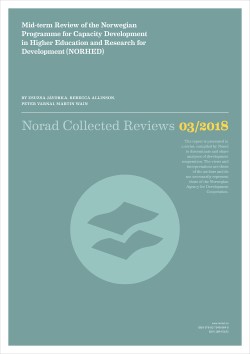Mid-term Review of the Norwegian Programme for Capacity Development in Higher Education and Research for Development (NORHED)
About the publication
- Published: January 2018
- Series: Norad Collected Reviews
- Type: --
- Carried out by: Technopolis Group
- Commissioned by: Norad
- Country:
- Theme: Education and research
- Pages: 81
- Serial number: 3/2018
- ISBN: --
- ISSN: 978-82-7548-964-5

The NORHED programme was established in 2012 and consists of 50 projects in 26 countries focusing on capacity building of universities in low and middle-income countries in partnerships with Norwegian higher education institutions.
The purpose of the NORHED Mid-term review has been to
- ascertain programme and project progress and preliminary results,
- to assess the programme's relevance, effectiveness and efficiency, and possible impact and sustainability
- provide recommendations to help improve the remaining period, and provide lessons for potential future programme design and implementation.
Findings
The report finds that the NORHED programme design and thematic focus are highly relevant both to the needs of the partner countries, as well as priorities of partner institutions. The partnership model based on south-north and south-south-north partnerships is considered key, and contributes to both capacity building and capacity exchange. The emphasize on the southern partner as the agreement partner, is further regarded as an important stepping stone to ensure local ownership and relevance. The participation of Norwegian higher education institutions is emphasized as important for knowledge transfer and sharing.
The report underlines that there is a need to put more emphasis on linking the project activities more strongly with relevant stakeholders from the outset. Obtaining buy-in from the local authorities and stakeholders would increase the potential impact and sustainability of the projects.
It is emphasized that there is no one-size-fits-all model for capacity building of higher education institutions. The report identified two types of capacity building models among existing projects. One category is referred to as "basic" capacity building, where project focus is mainly inward looking on capacity building of the institution. The other category consists of projects with a more outward-looking approach, reaching beyond the institutions and with the potential to contribute to broader social change.
In a possible new phase of the programme, Norad should ensure that consideration is given towards the sustainability of the project results from the outset. In addition, a two-phase approach could be considered, giving room for new partnerships and partner institutions in an early phase of capacity building, as well as more "mature" partnerships with greater potential for capacity building with a wider reach for societal change.
The report is conducted by Technopolis Group, commissioned by Norad.
